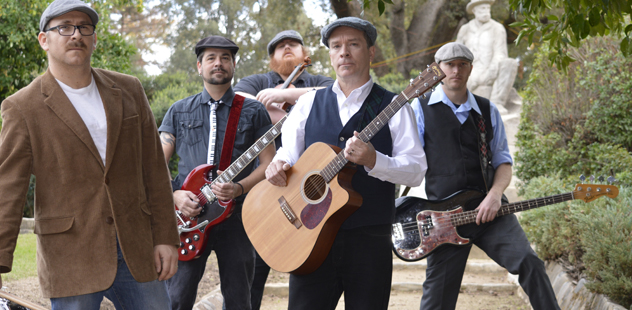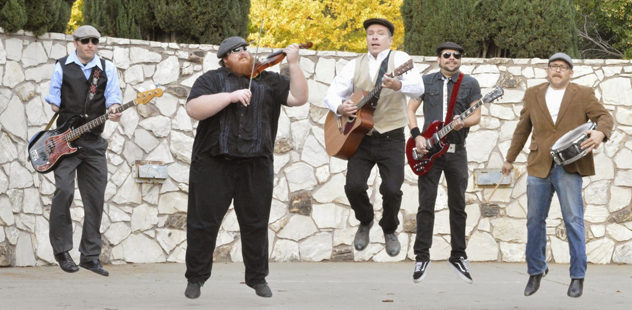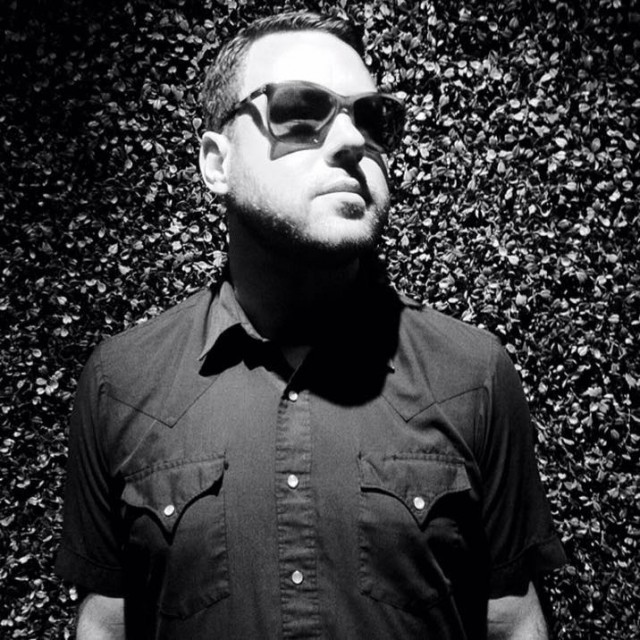 Photos by Ken Byes
Photos by Ken Byes
The Melting Pot
Gathered at the Hideaway Bar and Grill in Sacramento, Rick Meagher (vocals, rhythm guitar) Adrian Baxmeyer (bass guitar) and St. John Fraser (violin) of One Eyed Reilly were eager to discuss their new record. During our conversation the band opened up about their songwriting process, and how they turned an unfortunate accident into a strong musical bond.
Before the lads bellied up to the table to start the interview, they huddled around the jukebox creating a musical backdrop of punk rock by playing the Ramones, Against Me!, Rancid and The Clash. Once the mood was set, the band settled into their seats with a freshly poured round of Guinness—like any Celtic band should.
Rambunctious Celtic songs about Ireland and alcohol is where most people start when describing One Eyed Reilly’s debut album Hoist Your Glass. Though that description still holds true when it comes to the band’s newest album Barstools and Gravestones, the group’s musical growth is evident on their sophomore release, which ventures into Americana, country and even a little punk.
One Eyed Reilly’s growth and diversity has spilled over from the recording studio to the band’s live shows. “We’re definitely going to be bringing hard hitting country as much as we possibly can,” Baxmeyer said when asked how the band was going to approach their upcoming show with outlaw country artist Bob Wayne.
With their first album and a few years under their belt, the band was comfortable with expanding their sound, “We felt like [Hoist Your Glass] had to establish our Celtic credibility. As a songwriter I felt like every song had to be Celtic,” said Rick Meagher when comparing One Eyed Reilly’s albums. “On [Barstools and Gravestones] we didn’t feel as constrained because we had gotten our foot in the door and already established ourselves. With that being said there’s certainly plenty of Irish revelry on the second one as well.”

How do you feel you guys have grown in the last few years?
St. John Fraser: When the band was created, the premise was for everyone to have an equal part. All of our influences need to be heard in the band in some way or form. So we had a starting point, but as we’ve been playing together it has evolved. I think musically and certainly lyrically, it’s been a progression, not because it’s a choice, but because we are getting so much more accustomed to working with each other.
I have noticed a lot of historical references in your lyrics. Does your writing stem from personal experience or historical events?
Rick Meagher: Both. When I joined One Eyed Reilly I had also by coincidence gone to Ireland for a three-week trip. Having the experience of being in all of the pubs over there, and going to Dublin where the general post office was—where the Easter Rising in 1916 started—and seeing that they still haven’t repaired the bullet holes in the walls of the building. The reverence they have for that event and the fact that they haven’t fixed the bullet holes struck me. So that led to the opening line of the title track to our first album Hoist Your Glass.
Adrian, I heard that you were more of an athlete when you were younger, but through unfortunate circumstances [Adrian lost his right arm in a motorcycle accident] you found yourself turning to music.
Adrian Baxmeyer: I have always enjoyed listening to it but I never jumped into playing music. Losing the arm helped because I couldn’t play basketball and baseball like I used to and it was frustrating. So I decided to try music. There was kind of a learning curve to do it one-handed, then once I got that, I’ve only known how to do it one-handed.
Why did you choose an instrument that traditionally requires both hands to play, as opposed to the trumpet or another instrument that requires one hand?
AB: The trumpet was my first idea but then I was chatting with my dad and said, “You know I see Victor Wooten doing a lot of hammer-ons when he plays in addition to plucking and stuff,” and I was like, “Couldn’t I just do hammer-ons for everything?” At first I had a lot of fret buzz and a lot of string noise because I couldn’t dampen with the right hand, but as time went on I just learned how to do it with other fingers on my left hand.
St. John, why did you choose to play the Ramones on the jukebox?
SF: I grew up in a classical household and it was very structured. I was really only allowed to listen to classical music. My first concerts were all classical. I saw opera before I ever saw a rock concert, so as I started becoming a teenager and finding music—other than classical—I started stashing it in various places of my room. I listened to anything that was “stick it to the system.” I think it’s one of the reasons I’ve always had an affection toward punk in general. But yeah, there’s just something about the Ramones sound. Coming from a very orchestrated, technical world there’s something about the simplicity of it that delivered its message without messing around, it spoke to me.
RM: [St. John] always said [his dad] made him practice six hours a day, and it had to be six good hours or he would say, “two more.” When he got to be an adult he was burnt out and gave the violin up for 17 years.
How did it feel to start playing the violin again after 17 years?
SF: When I was young I was winning state competitions. I was being groomed to be a soloist. When you’re young it was a cool thing to a certain extent, but what I realized was that I was creating a distance. The unrelenting competition is just not who I am. But I realized part of me was missing. I love music and I realized that to a certain extent I was broken. There was a significant piece of me missing, and here I had a friend who was going through the struggles of learning an instrument.
AB: Actually when we first started out, [St. John] wouldn’t play the fiddle, he wouldn’t play the violin. He would only play the mandolin because it’s strung the same. When we really decided to be serious about this band I was like, “Let’s do this, but you have to play fiddle!”
SF: Yeah, Adrian was the inspiration for me to start playing music again. Music is such a wonderful thing and I hate the competitive side of music, but I love the collaborative side of music. I love sitting down and making music with Adrian because he is going to approach music uniquely. He’s going to approach it based off of his life experiences.
I noticed you guys have a diverse catalog of covers including songs like “Devil Went Down to Georgia.” How do you decide what you’re going to play live?
RM: Part of it is just responding to audiences. When we do “Devil Went Down to Georgia” people love it. It doesn’t matter if we’re playing Irish Night on the Delta King, they still love it. We’ll throw Wilco songs in there, we’ll play other Americana songs that people dig. Depending on the venue, depending on the event, or the occasion we’ll change it up.
You guys can get a little heavy at times too…
RM: We love punk elements, even in our original songs like “Higher Hand,” the second half definitely has punk aspects to it.
SF: That touches back to what we were talking about earlier. Everyone in the band is bringing in part of their influence and so it’s probably the best decision we’ve ever made to not pigeonhole ourselves into a specific sound. We’re always going to have our Celtic roots because we love them, but it’s fun to broaden our horizon to include Americana and folk and even country elements.
For more info on One Eyed Reilly visit 1eyedreilly.com. See them live at the Celtic Festival at the Nevada County Fairgrounds on Saturday, Oct. 3, 2015. The Celtic Festival runs Oct. 2-4. Tickets can be purchased through Kvmrcelticfestival.org.


Comments